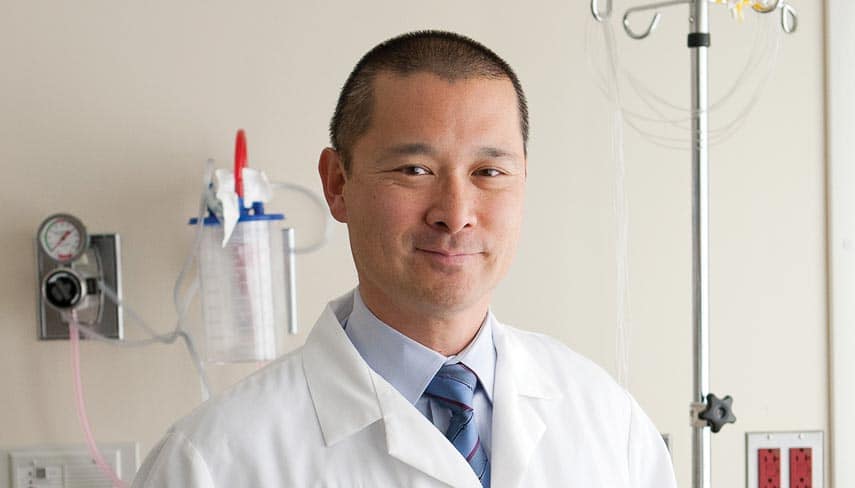Interview with Dr. William Chey from the University of Michigan
Researchers at Monash University in Australia might have developed the low FODMAP diet, but research is being done here in the United States as well and Dr. William Chey’s team at the University of Michigan is at the forefront.
Michigan Medicine is the academic medical center of the university and it is ranked as one of the top hospitals in the U.S. Dr. Chey is an MD specializing in gastroenterology, very involved in FODMAP research and graciously agreed to an interview.
Dédé Wilson: Dr. Chey, thank you so much for taking the time to chat with us about FODMAPs and IBS. I think it would be helpful for our readers to get a bit of background. Can you tell us a little about how the University of Michigan Health System works?
Dr. William Chey: I started with UM in 1990 as a GI fellow. The plan was return to Emory after fellowship but clearly things didn’t turn out quite as planned. When I joined the faculty in 1993, there were around 20 faculty members in the Division of GI. We now number over 85.
It has been an incredible journey over the past 25 years and I am very proud of the many programs we have built to care for patients with functional bowel and motility disorders and indeed, GI disorders in general. We built the Michigan Bowel Control Program in 2005 to provide integrated, multispecialty care to patients with severe chronic constipation and fecal incontinence.
Over the years, a number of programs have emulated our care model and our trainees continue to transform the care of these patients across the US.
In 2008, we created the GI nutrition program and we now have over 4 full time equivalents of nutrition support dedicated to GI. More recently, we established the GI Behavioral Medicine Program under the direction of Dr. Megan Riehl. Last year, we created one of the US’s only post-doctural training programs for GI behavioral therapists.
In aggregate, we have created a truly holistic, integrated care model – one that our providers and trainees likely take for granted. For those of us who have been practicing for many years, we often wonder how we provided comprehensive care before all of these assets were put in place.
It is gratifying to see how many other health systems and practices are beginning to embrace this care model – that being said, we have a long way to go as a specialty.
We at Michigan will continue to push the envelope, constantly trying to expand our care portfolio and helping to create the body of scientific evidence to help transform the practice of gastroenterology.
What is the relationship between the University of Michigan with Nestlé Health Science and Cedars-Sinai?
Brennan Spiegel and Chris Almario are physicians, scientists, and innovators at Cedars Sinai. Our team has developed mobile apps to help patients to more effectively manage their GI issues and work with health care providers.
Our first app called My GI Health is available free of charge in the Apple app store. It helps patients to assess and better understand their GI symptoms. The app can also prepare a written accounting of a person’s GI problems, which can be shared with a health care provider so he or she can understand a patient’s problems before a face to face visit.
Nestlé Health Sciences has shared our vision to develop resources to help patients starting a low FODMAP diet. They have generously supported the development of our website: www.myginutrition.com
Nestlé has also provided support to develop a mobile app which will help patients assess and track their GI symptoms and determine whether their symptoms are related to eating food.
The app will also unlock access to a suite of education materials which will help patients to navigate the 3 phases of the low FODMAP diet for which we have developed the acronym: ESP (Eliminate, reintroduce foods with FODMAPs to determine Sensitivites, and use this information to Personalize each patient’s diet).
Do you have an average day? What does that look like?
My favorite part of my job is that I get to do different things every day. Mondays and Thursdays, I care for patients while on Tuesdays I do procedures. Wednesdays and Fridays are devoted to leading a number of clinical programs, overseeing research projects, and mentoring residents, fellows, and faculty.
In between, I am very lucky to serve a number of organizations including the American College of Gastroenterology (ACG), American Neurogastroenterology & Motility Society, International Foundation of Functional GI Disorders (IFFGD), and the Rome Foundation. Whatever time I have left is devoted to our company My Total Health.
I carve out a couple of hours each evening to eat dinner and take walks with my family.
How did you first learn about the low FODMAP diet and did you know right away that you wanted to be involved on an academic and research level?
I first read an article about FODMAPs in 2005 by Peter Gibson and Sue Shepherd (Aliment Pharmacol Ther 2005; 21: 1399–1409). Though the article focused on Crohn’s disease, I felt that the basic concepts would be applicable to functional GI disorders like IBS I was excited when the Monash group turned their focus to IBS and I actually helped to introduce the FODMAP concept in the US at a national meeting in 2010.
I asked the audience how many had heard of FODMAPs and only a handful of attendees raised their hands. At that time, docs were still focused on low fat, lactose reduced, and high fiber diets for IBS, none of which worked with any consistency.
That was frustrating given how many IBS patients clearly said that food triggered their GI symptoms.
I was intrigued enough by the biological plausibility of the FODMAP concept and desperate enough as a doctor for an effective diet solution for my IBS patients that we at UM committed to building a group of registered dieticians dedicated to GI.
I am very lucky that the Chief of the GI Division (Chung Owyang) and Chairman of the Department of Medicine (John Carethers) shared my vision and supported efforts to build one of the nation’s first outpatient GI dietician programs.
I have also moved my research group to focus on diet therapies for IBS and other FGIDs. We recently published the first US randomized, controlled trial in adults with IBS with diarrhea. We are completing a trial, which will help us to understand the specific FODMAPs which are most likely to cause problems in IBS patients and another trial which will evaluate the benefits of the low FODMAP diet in IBS patients with constipation.
By the way – last year when I asked the audience of the postgraduate course at Digestive Diseases Week if they had heard of FODMAPs, almost all hands went up – what a change!
Can anyone visit your clinics and get help with their IBS?
We are very lucky to have over 10 doctors who are dedicated to caring for patients with functional GI disorders at UM. Patients who are interested in making an appointment can call (888) 229-7408.
In the clinical setting, what are some of the greatest challenges that you see when introducing the diet to patients? What have you and your team done to try and mitigate those issues?
Though many gastroenterologists and even some PCPs are now recommending the low FODMAP diet to their IBS patients, there remain significant gaps in delivery of care.
We published results from a survey of over 1500 US gastroenterologists, which showed that the vast majority recommend dietary changes to their IBS patients of which the low FODMAP diet is most popular.
Most gastroenterologists used printed handouts to help IBS patients incorporate the diet into their daily lives. Only 21% usually or always referred their IBS patients to a dietician and of those that did, only a minority referred specifically to a trained GI dietician.
Given that the diet requires significant counseling and consists of 3 phases during which patients often require support, this is less than ideal.
It would be easy to blame gastroenterologists for this issue. However, there is a range of reasons for the findings of our survey. For example, many health insurance plans do not cover visits with a dietician. Second, there are relatively few trained GI dieticians.
Further, though there are an endless number information sources about the low FODMAP diet, it is hard for health care providers to know which ones are high quality and up to date.
In addition to our site (www.myginutrition.com), Kate Scarlata, Patsy Catsos, and Monash University have excellent online resources and the Monash mobile app can also be very helpful for patients using the diet.
How does Monash University figure into your practice? Do you base your recommendations upon their research?
I had the opportunity to spend 2 weeks at Monash in 2016. Peter Gibson, Jane Muir and their group were welcoming hosts. During that trip, I was impressed by their enthusiasm and the rigor of their research. I learned a great deal about the dos and don’ts of doing diet research in IBS.
The Monash group members are true pioneers in diet research for IBS and IBD. They are to be commended for suffering the slings and arrows of introducing a game-changing concept to gastroenterology.
That being said, I know they are proud and gratified with what they have been able to accomplish. We were pleased to recently welcome Peter Gibson as a visiting professor at UM.
If the diet isn’t working for a patient, what is the most common reason? Is there a common reason?
IBS being a symptom-based diagnosis is not one disease but likely many diseases. Unfortunately, we are currently not scientifically sophisticated enough to be able to distinguish patients on the basis of the cause of their symptoms.
As such, we rely upon symptoms to choose treatments for an individual IBS patient. This explains why no therapy for IBS makes more than around half to two thirds of IBS patients better.
Diet therapies including the low FODMAP diet are not exempt from this statement. At the end of the day, the low FODMAP diet should be viewed as a treatment for IBS not the treatment for IBS. There is still a very important place for medical treatments for IBS.
Further, behavioral therapies and even some complimentary alternative therapies can be very helpful in IBS patients. We are increasingly recognizing that many IBS patients require more than one form of therapy – thus, having as many of these arrows in your treatment quiver improves the likelihood of helping your IBS patients.
And if someone is within the 25% of whom the diet doesn’t work for, what is your next step as their doctor?
I am excited about the rapidly expanding knowledge base on other diet therapies for IBS. As I just mentioned, multi-modal therapy maximizes outcomes and is now, the standard of care at UM and other leading centers in the US.
Tell us about the William D. Chey Research Fund at the university. And how can people donate to help future IBS research, nutritional care and education?
I am fortunate to lead a large clinical research group at UM. We focus on creating and validating new techniques to enhance the diagnosis and treatment of functional GI disorders. In the coming years, our group will work tirelessly to stay true to the mantra: “Lead not follow”.
● We will create and/or validate more holistic management models that incorporate not only medications but also diet and behavioral strategies.
● Through research conducted by our group and collaborations with other academic institutions and industry partners, we will identify biomarkers that will move the diagnosis of patients with FGIDs beyond symptoms alone. The ultimate goal is to accelerate the evolution of clinical care from the current model, which relies almost exclusively on symptoms to choose a treatment for a patient, to a “precision medicine” model in which the choice of therapy will be based upon symptoms combined with biomarkers, which will utilize genetics, microbiome, and metabolomics to choose the right therapy for the right patient.
● We will leverage technology to transform the way that doctors and patients interact and learn from one another. Using novel eHealth platforms, we will utilize big data to transform the clinical care landscape from empirical to precision medicine.
For more information or to make a donation, readers can visit our website here. And see the bottom of this post to donate AND recieve a copy of our ebook “50 Certifiably Delicious Low FODMAP Recipes”.
I’d like to touch upon your late 2017 study on IBS, the low FODMAP diet and quality of life. You looked at the relationship between the diet and a reduction in anxiety and depression, its affect on work productivity and sleep quality.
At the 4-week mark you found significantly greater positive quality of life results for those following the low FODMAP diet versus those following traditional dietary recommendations. Are there any studies coming down the pike that look at longer term results of the low FODMAP diet on quality of life?
We aren’t doing any long-term studies at present but this would certainly be of interest.
Is there anything you can share with us about current or soon-to-be-undertaken research on the diet at the University of Michigan?
● Determining the role of the low FODMAP diet for abdominal pain and bloating in patients with IBS and constipation.
● Conducting studies to determine the most efficient and effective means of reintroducing FODMAPs in patients who improve after excluding FODMAPs from their diet.
● Identifying biomarkers that will help health care providers to determine which IBS patients are most likely to improve with the low FODMAP diet.
● Conducting a clinical trial to compare the effectiveness of psyllium, prunes, and kiwi as treatments for chronic constipation. This will be the first US trial to evaluate kiwi for constipation.
● Determining whether breath testing identifies IBS patients who are more likely to improve with the non-absorbed antibiotic rifaximin.
● Determine the best test to identify patients with intestinal enzyme deficiencies – an enzyme called sucrase isolmaltase is responsible for breaking down table sugar and starch. Lack of this enzyme can cause symptoms that are identical to lactose intolerance and may be an unrecognized cause of IBS.
● Testing a novel IgG antibody test that can identify patients with food sensitivities.
● Assisting in the development of a novel prebiotic that alters the gut microbiome in a way that improves the symptoms of lactose intolerance.
● Exploring a magnification endoscopy technique called confocal laser endomicroscopy to identify food sensitivities in patients with upper and lower GI symptoms.
You are on the Board of Directors for the Rome Foundation and I know that sometimes a lay person will hear a doctor or dietitian reference the “Rome criteria” for defining IBS and wonder what that means.
Can you tell us a little about the Rome Foundation and why they determine the definitions?
The Rome Foundation is an international organization dedicated to improving the lives of patients with Functional Bowel Disorders through the development of diagnostic criteria for clinical research and clinical practice and education. The “Rome criteria” are the current standard for the diagnosis of all functional GI disorders including IBS.
The Foundation convenes international working groups to tackle controversial issues in the field and in the process of creating the Rome Foundation Research Institute, which will create an international research network to accelerate scientific discovery relevant to IBS and other functional disorders.
The changes from Rome III (published in 2006) to Rome IV (2016) center around the gut-brain interaction. Again, patients will hear that “gut-brain” concept mentioned or even read about it in mainstream media and I think it can be challenging to understand.
Can you help put this into easy-to-understand terms?
This concept refers to the two-way relationship between the brain and the GI tract. Everyone has had the experience or knows someone who has GI issues when stressed or anxious. Think about getting diarrhea before a big game or getting nauseated before a tough test.
While everyone recognizes the influence of the brain on the gut – people are less familiar with the influence of the gut on the brain. Consider if you always got diarrhea or pain after eating a meal.
Over time, meals would become quite stressful. Anticipation of getting diarrhea or pain could activate parts of the brain, which can cause a person to be more prone to developing GI issues.
This is turn, could set a person up to become stuck in a vicious cycle. This is why IBS patients often don’t go to restaurants and know where every bathroom is located when they leave their homes.
Often, patients don’t recognize the important role that stress and anxiety can play in their symptoms, focusing instead on food or other factors that they feel are the cause of their IBS symptoms.
The key is not to dismiss the possibility that stress or anxiety may be aggravating a person’s symptoms. It is also worth mentioning the possible role of the gut bacteria or “microbiome” in brain-gut interactions. It is known that acute GI infections can cause IBS.
We also know that the microbiome differs between normal people and IBS patients. Also, stress and anxiety can alter the microbiome and altering the gut microbiome with diet or probiotics can improve psychological symptoms in IBS patients. This has led to the concept of the “brain-gut-microbiome axis.”
And, if you have any free time, although we are trying to figure out how that is possible, what do you like to do to unwind?
Outside of work, I have 2 passions – my family and golf. I appreciate that virtually all things in our professional lives are transient. For the most part, our time in the spotlight and our influence on the field may be all the rage today but largely forgotten tomorrow.
Science like time, moves on. The only lasting legacy that we leave behind is our family. I am very lucky to have a wife and children that love me as much as I love them. I do love to play golf when I can – it allows me to completely clear my mind, relax and focus on the task at hand. Golf has also allowed me to develop relationships outside of medicine.










